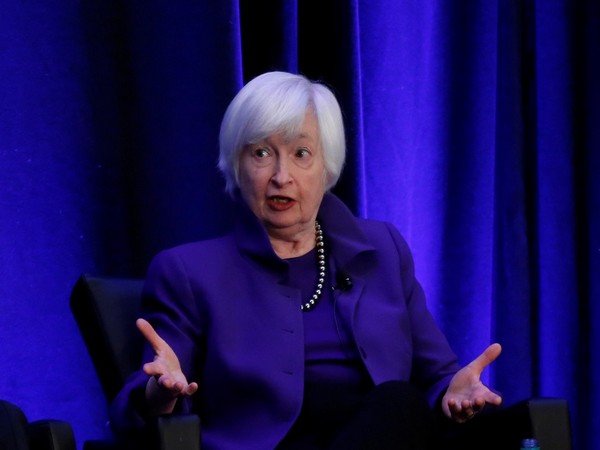WRAPUP 8-Germany agrees to new COVID curbs, Yellen says pandemic could be here for a while
Germany agreed on new COVID-19 restrictions on Thursday and the United States prepared to do the same, while U.S. Treasury Secretary Janet Yellen said the Omicron variant showed the pandemic could be around for "some time". The new variant is spreading across the globe, with countries including the United States, India https://www.reuters.com/world/india/india-says-it-detects-two-cases-omicron-variant-2021-12-02 and France https://www.reuters.com/world/europe/french-govt-science-adviser-covid-delta-variant-is-main-fight-right-now-looking-2021-12-02 reporting their first cases and investors rattled by the prospect that it could hurt the global economic recovery.

- Country:
- United States
Germany agreed on new COVID-19 restrictions on Thursday and the United States prepared to do the same, while U.S. Treasury Secretary Janet Yellen said the Omicron variant showed the pandemic could be around for "some time".
The new variant is spreading across the globe, with countries including the United States, India https://www.reuters.com/world/india/india-says-it-detects-two-cases-omicron-variant-2021-12-02 and France https://www.reuters.com/world/europe/french-govt-science-adviser-covid-delta-variant-is-main-fight-right-now-looking-2021-12-02 reporting their first cases and investors rattled by the prospect that it could hurt the global economic recovery. In an interview https://www.reuters.com/business/finance/us-treasurys-yellen-says-ready-retire-transitory-describe-inflation-2021-12-02 with Reuters, Yellen said she hoped the pandemic would not completely stifle economic activity, adding that the U.S. stimulus at the start of the pandemic had helped fuel a very strong recovery.
The new measures agreed in Germany focus on the unvaccinated, who will be barred from access to all but the most essential businesses such as grocery stores and pharmacies. Germany is also planning legislation to make vaccination mandatory. "We have understood that the situation is very serious and that we want to take further measures in addition to those already taken," Chancellor Angela Merkel told a news conference.
"To do this, the fourth wave must be broken and this has not yet been achieved," she said, referring to Germany's latest surge in cases. A nationwide vaccination mandate could take effect from February 2022 after it is debated in the Bundestag and after guidance from Germany's Ethics Council, she said. Eager to avoid lockdowns that could derail a fragile recovery of Europe's biggest economy, Germany kept businesses open to the almost 69% of the population that is fully vaccinated as well as those with proof of having recovered from COVID-19.
Much remains unknown about Omicron, which was first detected in southern Africa last month and has been spotted in at least two dozen countries, just as parts of Europe were already grappling with a wave of infections of the Delta variant. But the European Union's public health agency said Omicron could be responsible for more than half of all COVID infections in Europe within a few months, lending weight to preliminary information about its high transmissibility.
South Africa said it was seeing an increase in COVID-19 reinfections in patients contracting Omicron - with people who have already had the illness getting infected again - in a way that it did not see with other variants. Global shares fell on Thursday, reversing gains from the previous session as a lack of information about Omicron left markets volatile, while crude oil futures extended losses.
TRAVEL RESTRICTIONS In the United States, the Biden administration was expected to announce steps included extending requirements https://www.reuters.com/world/us/exclusive-us-extend-transit-mask-mandate-through-mid-march-sources-2021-12-01 for travellers to wear masks through mid-March later on Thursday.
By early next week the United States will require inbound international travellers to be tested for COVID-19 within a day of departure, regardless of vaccination status. It will also require private health insurance companies to reimburse customers for at-home COVID-19 tests, a senior administration official said.
The first known U.S. case https://www.reuters.com/business/healthcare-pharmaceuticals/us-reports-first-case-omicron-variant-2021-12-01, announced late on Wednesday, was a fully vaccinated person in California who had travelled to South Africa. The two French cases, in the greater Paris region and in eastern France, were passengers arriving respectively from Nigeria and South Africa. Russia has imposed a two-week quarantine for travellers from some African countries including South Africa, the Interfax news agency said, quoting a senior official. Hong Kong extended a travel ban to more countries.
Amid all the new restrictions, Europe's largest budget airline, Ryanair, said it expected a challenging time at Christmas, although it was still optimistic about summer demand. In Canada, industry groups warned that a plan to require COVID-19 testing for all but U.S. arrivals on international flights risked causing chaos and long lines if passengers were expected to get tested at airports.
In the Netherlands, health authorities called for pre-flight COVID-19 tests for all travel from outside the European Union, after it turned out that about 90% of the 62 passengers who tested positive after arriving on two flights from South Africa on Nov. 26 - including all those with the Omicron variant - had been vaccinated.
(This story has not been edited by Devdiscourse staff and is auto-generated from a syndicated feed.)










